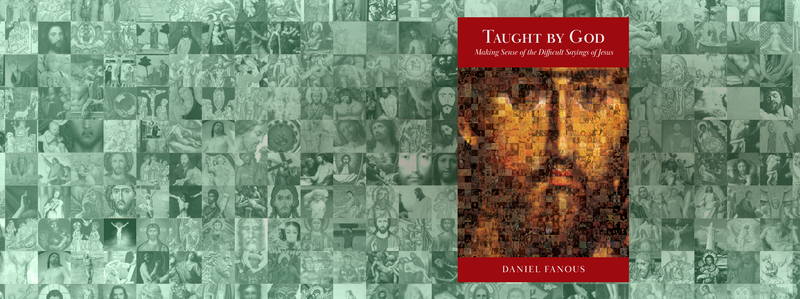Review: Taught By God
Posted by SVS Press on 23rd Jun 2020
The serious student of the Bible who is also an Orthodox Christian always had a particular quandary. He could try the commentary of the Fathers, which were soundly Orthodox, but might struggle with an awkward translation. He could turn to the over-abundance of Protestant and Catholic Biblical scholarship, but they did not reflect the mind of the Orthodox Church.
Into this dilemma comes a new SVS Press release, Taught by God: Making Sense of the Difficult Sayings of Jesus by Orthodox Biblical scholar Daniel Fanous, who tackles fifteen of the most difficult sayings of Jesus. Fanous quotes Protestant, Catholic, and even Jewish scholarship, but his conclusions are solidly in the tradition of the Fathers and in the mind of Orthodox theology.
Take his chapter on the saying of Jesus: “I did not come to bring peace but a sword” (Mt 10.34). Did Christ really mean to advocate violence? Do we not call him the “prince of peace”? Fanous deals with this question by expertly weaving together a number of strands of scholarship as well as Biblical and historical texts. He always defines both the Galilean and Aramaic context of Jesus' words as well as the first-century Palestinan cultural context. As was said earlier, he quotes both Protestant and Catholic scholars and brings in important passages from the Old Testament (in this case, Micah 7.6) and even of the Jewish Mishnah (the “oral Torah”) in order to show that Christ was fulfilling Messianic requirements. He even discusses Jesus’ own family dynamics. And he quotes obscure but illuminating passages from the Desert Fathers. He finally brings all this together by discussing the nature of unity in the Holy Trinity and how fallen man tried to regain that sense of unity by building false unities (families, tribes, nations) that eventually go to war with other false unities. He writes:
It was into this world of false unity that Jesus was sent; a world in which the unity from below had rule. It was into this world that he cried out solemnly: “I did not come to bring peace but a sword.” He comes not to bring peace to these false “unities,” each united against another. He comes, sword in hand, to divide all who “have made a unity against Unity.” As God had divided the language of the “united” men as they built their idolatrous tower of Babel, Jesus also divides. He brings “a necessary conflict” in order “to break an evil peace.” He places “man against father” and “daughter against mother” to undo the very bonds that have deceived man into a state of false unity. The family was the fundamental unit of unity in human life. To destroy false unity in its every place, Jesus was required first to remove these most fundamental of bonds. An anonymous Church Father puts it thus: There is a good peace and there is an evil peace. . . . In this way then God brought a good disunity to the earth in order to break an evil unity. . . . God [thus] brought a sword of disunity among them.
For centuries the difficult sayings of Jesus have confused even accomplished theologians. The question has always been: what did Christ really mean? I cannot overstate what Fanous has achieved here in dealing with these challenging texts and by presenting a compelling synthesis of thought, sometimes across the centuries. Taught by God is a real triumph for students of the Bible who, in the end, want to make sure that they are getting a solidly Orthodox interpretation.
Click here to order a copy of Taught By God.




